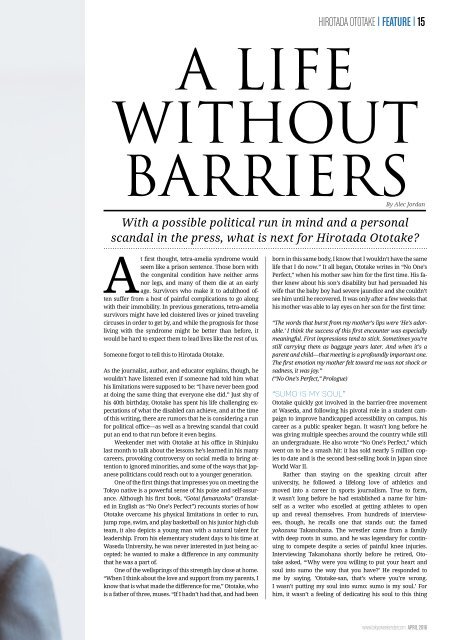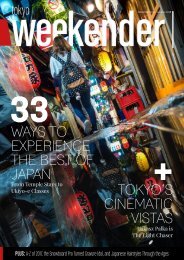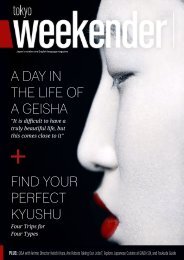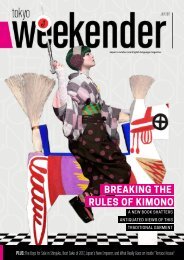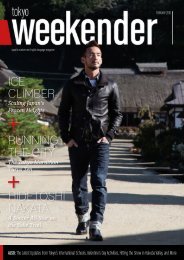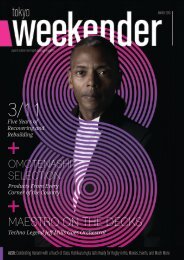Tokyo Weekender - April 2016
Hirotada Ototake- No arms, no legs, no limits. Plus: Natsumi Hoshi Swims for Rio Gold, Getaways for Golden Week, Tokyo Area Guide, The Evolution of Cirque du Soleil, and Much More
Hirotada Ototake- No arms, no legs, no limits. Plus: Natsumi Hoshi Swims for Rio Gold, Getaways for Golden Week, Tokyo Area Guide, The Evolution of Cirque du Soleil, and Much More
Create successful ePaper yourself
Turn your PDF publications into a flip-book with our unique Google optimized e-Paper software.
HIROTADA OTOTAKE | FEATURE | 15<br />
A Life<br />
Without<br />
BarriersBy Alec Jordan<br />
With a possible political run in mind and a personal<br />
scandal in the press, what is next for Hirotada Ototake?<br />
At first thought, tetra-amelia syndrome would<br />
seem like a prison sentence. Those born with<br />
the congenital condition have neither arms<br />
nor legs, and many of them die at an early<br />
age. Survivors who make it to adulthood often<br />
suffer from a host of painful complications to go along<br />
with their immobility. In previous generations, tetra-amelia<br />
survivors might have led cloistered lives or joined traveling<br />
circuses in order to get by, and while the prognosis for those<br />
living with the syndrome might be better than before, it<br />
would be hard to expect them to lead lives like the rest of us.<br />
Someone forgot to tell this to Hirotada Ototake.<br />
As the journalist, author, and educator explains, though, he<br />
wouldn’t have listened even if someone had told him what<br />
his limitations were supposed to be: “I have never been good<br />
at doing the same thing that everyone else did.” Just shy of<br />
his 40th birthday, Ototake has spent his life challenging expectations<br />
of what the disabled can achieve, and at the time<br />
of this writing, there are rumors that he is considering a run<br />
for political office—as well as a brewing scandal that could<br />
put an end to that run before it even begins.<br />
<strong>Weekender</strong> met with Ototake at his office in Shinjuku<br />
last month to talk about the lessons he’s learned in his many<br />
careers, provoking controversy on social media to bring attention<br />
to ignored minorities, and some of the ways that Japanese<br />
politicians could reach out to a younger generation.<br />
One of the first things that impresses you on meeting the<br />
<strong>Tokyo</strong> native is a powerful sense of his poise and self-assurance.<br />
Although his first book, “Gotai fumanzoku” (translated<br />
in English as “No One’s Perfect”) recounts stories of how<br />
Ototake overcame his physical limitations in order to run,<br />
jump rope, swim, and play basketball on his junior high club<br />
team, it also depicts a young man with a natural talent for<br />
leadership. From his elementary student days to his time at<br />
Waseda University, he was never interested in just being accepted:<br />
he wanted to make a difference in any community<br />
that he was a part of.<br />
One of the wellsprings of this strength lay close at home.<br />
“When I think about the love and support from my parents, I<br />
know that is what made the difference for me,” Ototake, who<br />
is a father of three, muses. “If I hadn’t had that, and had been<br />
born in this same body, I know that I wouldn’t have the same<br />
life that I do now.” It all began, Ototake writes in “No One’s<br />
Perfect,” when his mother saw him for the first time. His father<br />
knew about his son’s disability but had persuaded his<br />
wife that the baby boy had severe jaundice and she couldn’t<br />
see him until he recovered. It was only after a few weeks that<br />
his mother was able to lay eyes on her son for the first time:<br />
“The words that burst from my mother’s lips were ‘He’s adorable.’<br />
I think the success of this first encounter was especially<br />
meaningful. First impressions tend to stick. Sometimes you’re<br />
still carrying them as baggage years later. And when it’s a<br />
parent and child—that meeting is a profoundly important one.<br />
The first emotion my mother felt toward me was not shock or<br />
sadness, it was joy.”<br />
(“No One’s Perfect,” Prologue)<br />
“SUMO IS MY SOUL”<br />
Ototake quickly got involved in the barrier-free movement<br />
at Waseda, and following his pivotal role in a student campaign<br />
to improve handicapped accessibility on campus, his<br />
career as a public speaker began. It wasn’t long before he<br />
was giving multiple speeches around the country while still<br />
an undergraduate. He also wrote “No One’s Perfect,” which<br />
went on to be a smash hit: it has sold nearly 5 million copies<br />
to date and is the second best-selling book in Japan since<br />
World War II.<br />
Rather than staying on the speaking circuit after<br />
university, he followed a lifelong love of athletics and<br />
moved into a career in sports journalism. True to form,<br />
it wasn’t long before he had established a name for himself<br />
as a writer who excelled at getting athletes to open<br />
up and reveal themselves. From hundreds of interviewees,<br />
though, he recalls one that stands out: the famed<br />
yokozuna Takanohana. The wrestler came from a family<br />
with deep roots in sumo, and he was legendary for continuing<br />
to compete despite a series of painful knee injuries.<br />
Interviewing Takanohana shortly before he retired, Ototake<br />
asked, “‘Why were you willing to put your heart and<br />
soul into sumo the way that you have?’ He responded to<br />
me by saying, ’Ototake-san, that’s where you’re wrong.<br />
I wasn’t putting my soul into sumo: sumo is my soul.’ For<br />
him, it wasn’t a feeling of dedicating his soul to this thing<br />
www.tokyoweekender.com APRIL <strong>2016</strong>


